- Local Time: 12:10 PM
- Weather: 31 ℃ / 88 ℉
This article provides a rich and detailed overview of ancient Egyptian people, those who built one of the world’s most influential civilizations. It emphasizes the collective role of all societal members, from farmers and craftsmen to priests and scribes, in upholding harmony (ma’at), religious devotion, and innovation. Daily life was shaped by family, work, rituals, education, and trade, with men and women both holding unique rights and responsibilities. The article explores how Egyptians lived in mudbrick homes, brewed beer, practiced medicine, and revered the afterlife and magic. Despite a rigid social structure, every person contributed to divine order and cultural prosperity. Ultimately, the article honors the resilience, wisdom, and humanity of ancient Egyptian society, a legacy that continues to inspire the world.
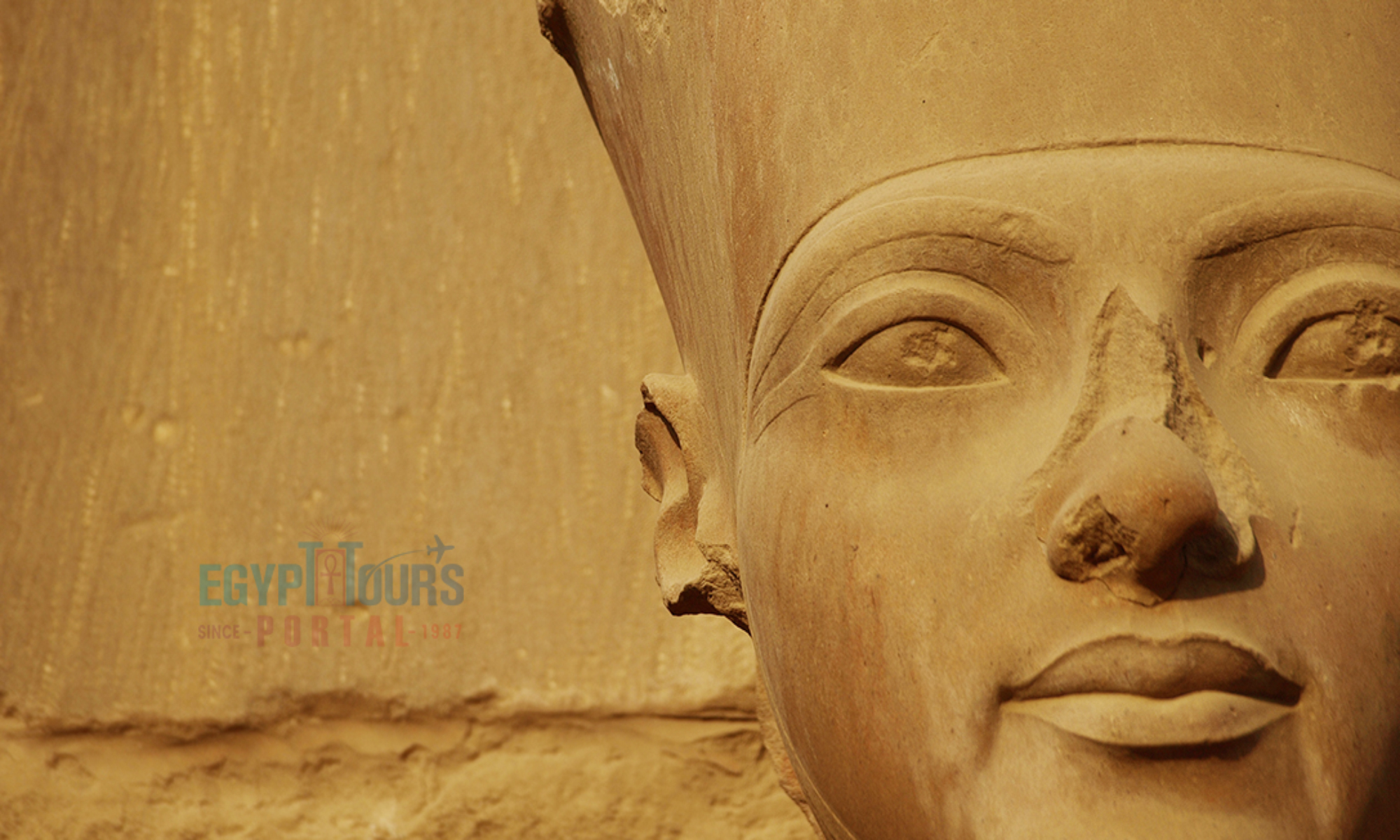
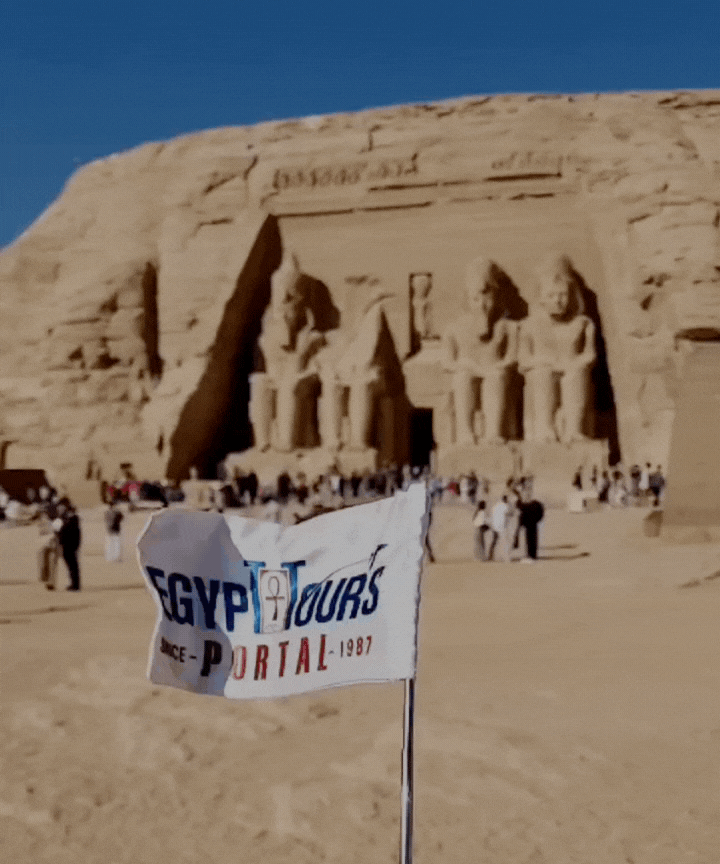
Ancient Egyptian people figured out the key to innovation and prosperity for over 5000 years, where they harnessed their surroundings, forces of nature, strong will, intelligence, and divine interventions to achieve what no other civilization has achieved in the history of the world. The ancient Egyptians, in 3000 years, were able to create an everlasting heritage of art, architecture, science, and culture that has a great positive impact on the development of humanity itself.
The ancient Egyptian society had a rigid social hierarchy, with the king enjoying the highest status and wealth. The belief in divine ordination and the concept of ma'at influenced the strict social divisions and limited social mobility throughout much of Egypt's history.
The ancient Egyptians understood the secrets to longevity of the ancient Egyptian civilization which provided the needed time to the rise for some important individuals that changes the cultivated of this civilization with the passing of time, customs, and practices that shaped their society in diverse ways across their daily routines, religious beliefs, social structure, trade, cuisine, entertainment, and many more.

Across the history of ancient Egypt, several influential people created an epic legacy that decided the destiny of this immortal civilization. The civilization's long and complex history has been shaped by a multitude of talented and influential people over several millennia. Egypt was truly gifted by several magnificent people who paved a new path for Egypt across the heavenly legacy of stood the test of time for ages. The influential people of ancient Egypt were responsible for making impressive achievements, military conquests, and architectural marvels like the Great Pyramids.
Everyone in Egypt played a vital role in the excellence of this immortal civilization, who were highly skilled architects, blessed physicians, and esteemed scribes, plus great rulers who ushered in a new age of greatness. These are just a few examples of the many important individuals who left their mark on Ancient Egyptian history; King Narmer (Menes) is regarded as the first pharaoh who unified Upper and Lower Egypt around 3100 BCE and created the first dynasty.
The incredible polymath and architect Imhotep served under Pharaoh Djoser during the 27th century BCE, and is best known for designing the Step Pyramid at Saqqara, one of the earliest monumental stone structures. Pharaoh Khufu is known for commissioning the Great Pyramid of Giza, one of the Seven Wonders of the Ancient World. Pharaoh Hatshepsut was the first known female pharaoh who ruled during the 18th Dynasty and led successful military campaigns and impressive building projects. Pharaoh Ramses II (Ozymandias) was one of the most powerful and prolific pharaohs who reigned for 66 years and built many monuments.
The tomb of Pharaoh Tutankhamun was discovered in 1922 and became one of the most significant archaeological discoveries of all time. Akhenaten is renowned for his attempt to transition Egypt from polytheism to monotheism, focusing on the worship of the sun god Aten, which failed miserably. Cleopatra VII was a skilled diplomat and captivating ruler. She famously engaged in relationships with Julius Caesar and Mark Antony, influencing the politics of the Roman Republic.
Thutmose III expanded Egypt's empire to its largest territorial extent while creating some incredible monuments. Amenhotep III was an opulent ruler who oversaw extensive building projects and was the father of Akhenaten. Senenmut was an influential architect during the reign of Hatshepsut, who oversaw many of her construction projects, including the temple of Deir el-Bahri. The ancient vizier and sage Ptahhotep is famous for his wisdom texts, including "The Maxims of Ptahhotep," which offered ethical guidance.
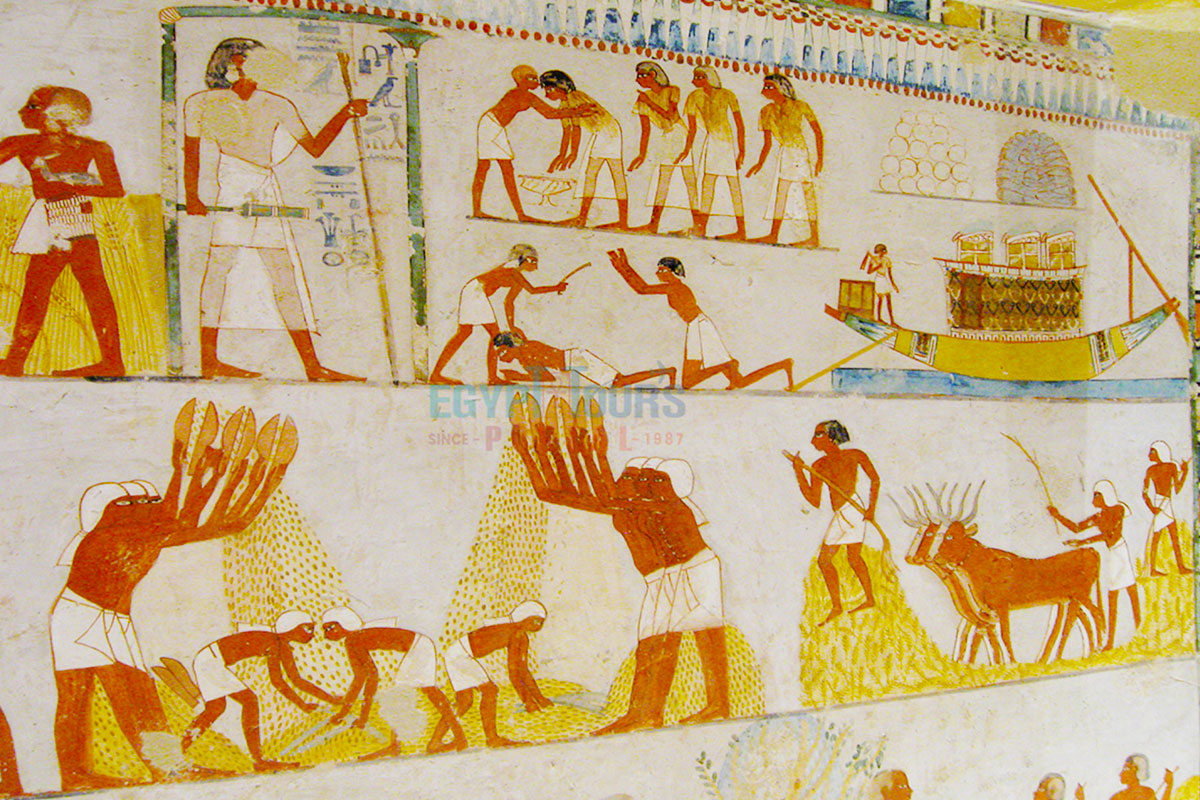
The daily life of the ancient Egyptians was a deeply religious culture that inspired rulers to create incredible temples and pyramids. They enjoyed life no matter what their social class was. Ancient Egyptian society was organized into social classes represented by a pyramid structure. The king and queen, considered divine, occupied the top, followed by an educated professional class, a working class, and a lower class of servants and farmers.
Family was essential, and marriages were often arranged at a young age. Ancient Egyptian Women had relatively high status and could hold important roles in society. Ancient Egyptian Houses were made of adobe with courtyards and flat roofs. Egyptian daily life revolved around enjoying time with family and friends, participating in sports, games, reading, and festivals, alongside agricultural work and monument construction.
Magic (heka) played a significant role in Egyptian life, predating the gods and enabling them to perform their duties. The concept of ma'at (harmony and balance) was essential, and magic facilitated its preservation, encouraging people to live in harmony with others and contribute to communal happiness. The Nile River played a central role in daily life, providing fertile land for crops and transportation. The diet was primarily vegetarian, with fish as the main source of protein, and beer was a common beverage.
Egyptians engaged in various forms of entertainment, sports, and festivals with religious significance. Clothing was made of linen, and both men and women wore kilts. Medicine was a blend of science and magic, and they practiced mummification for the afterlife. The polytheistic religion had numerous deities, and they made significant contributions to technology, including hieroglyphics, papyrus, the lunar calendar, and timekeeping devices. Crime was punished swiftly, and justice was overseen by local courts and religious figures.
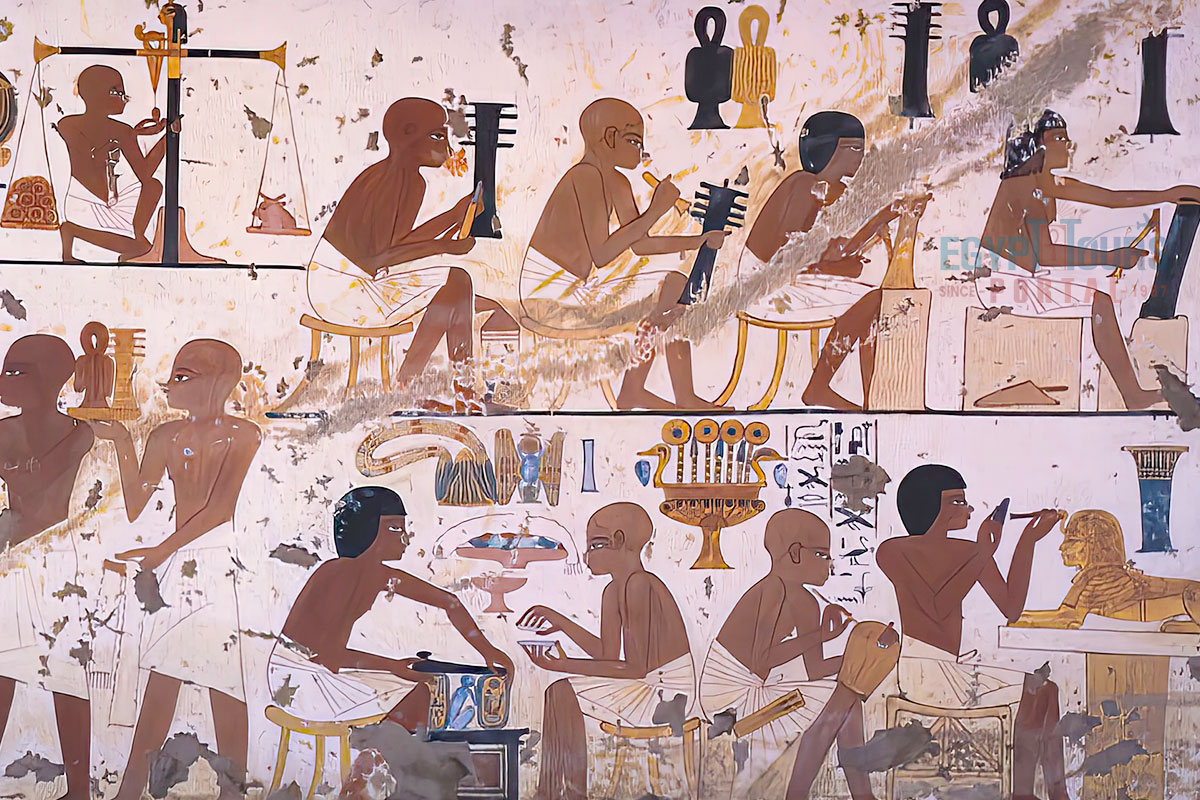
Like any advanced ancient society, all the ancient Egyptian people had several occupations and jobs, as every single member of the society was highly productive, no matter the differences in social classes. The majority of the population was made up of peasant farmers who planted and harvested crops, as the Egyptian economy was based on agriculture, which was operated on the foundation of the barter system. They excelled in several jobs which including brewers, musicians, artisans, doctors, scribes, builders, carpenters, and many others.
The scriber was very valued in ancient Egypt, who was seen as chosen by the gods of knowledge and writings, Thoth and his consort Seshat, the patron goddess of libraries and librarians. Scribes were male and female,e plus all of them were priests. They were responsible for writing and reading their duties concerning their mortuary rituals. The scribes also acted as doctors who could comprehend religious texts and perform many medical procedures, including dentistry, the setting of broken bones, surgery, and the treatment of various illnesses.
Ancient Egypt engaged in extensive trade with various foreign regions to acquire rare and exotic goods not naturally found within its borders. The ancient Egyptian trade began in the Predynastic Period in Egypt ( 6000 - 3150 BCE) and continued to Roman Egypt (30 BCE- 646 CE), with interactions with Nubia for gold and incense, and with Palestine, evident from the presence of Palestinian-style oil jugs in First Dynasty pharaohs' burials. Even before the First Dynasty, an Egyptian colony existed in southern Canaan.
During the Second Dynasty, trade with Byblos became essential for obtaining high-quality timber unavailable in Egypt. By the Fifth Dynasty, trade with Punt, an elusive and distant region, supplied Egypt with gold, aromatic resins, ebony, ivory, and exotic animals like monkeys and baboons. Egypt also relied on trade with Anatolia for obtaining tin, vital for bronze production, and additional supplies of copper.
Another prized import was lapis lazuli, a blue stone that came from faraway ancient Afghanistan. Mediterranean trade partners, such as Greece and Crete, also played a significant role in Egypt's trade network, providing various goods, including supplies of olive oil. These extensive trade connections enriched ancient Egypt with diverse and valuable resources, contributing to its prosperity and cultural development.
Discover all the Jobs that made the ancient Egyptian civilization stand the test of time
Read More
Ancient Egyptian civilization was deeply rooted in mythical beliefs concerning the divine and the afterlife. Pharaonic rule was based on the concept of divine right, considering the pharaoh as a representative of the gods on Earth. The Egyptian pantheon consisted of over 2000 powerful gods who were invoked for assistance, blessings, and protection, though they were not always seen as benevolent and required appeasement through offerings and prayers.
The structure of the pantheon evolved continuously, with new deities rising in prominence, but there was no attempt by priests to organize the diverse myths into a unified system. Ancient Egyptian Gods and Goddesses were worshiped in cult temples administered by priests on behalf of the king. Temples were not places of public worship, and access to the god's domain was restricted to temple officials.
Common people could worship private statues in their homes, and amulets were used for protection against chaos. Over time, the pharaoh's role as a spiritual intermediary diminished, and direct worship of the gods became more prominent, with priests establishing oracles to communicate the gods' will to the people.
The ancient Egyptians believed in the existence of physical and spiritual aspects within each individual, including the body, shadow, personality (ba), life-force (ka), and name. After death, these spiritual aspects would separate from the body and continue to exist. The ultimate goal of the deceased was to reunite the ka and ba and become one of the "blessed dead" or akh, allowing them to live on in a spiritual form. To achieve this, the deceased had to undergo judgment in the hall of truth under the supervision of the ruler of the underworld, Osiris, where their heart was weighed against the feather of Maat, "feather of truth." If found worthy, they could continue their existence in the afterlife, but if deemed unworthy, they faced erasure from the universe by Ammit the Devourer.
These beliefs in the afterlife and the pursuit of a favorable judgment shaped Egyptian funerary practices and influenced the construction of elaborate tombs and burial rituals.
Uncover the religious wealth of the ancient Egyptian civilization
Read More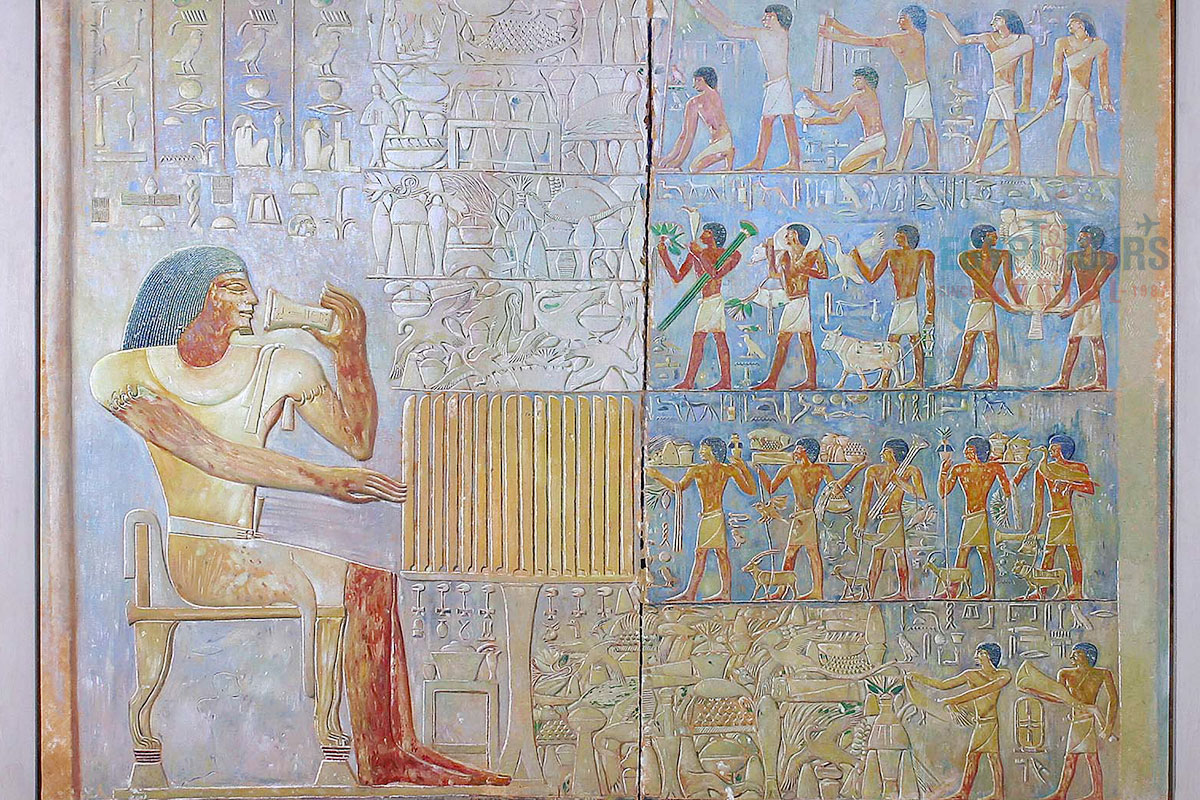
Ancient Egyptian society was strictly stratified into social classes, with the king at the top, followed by his vizier, court members, regional governors (nomarchs), military generals (during the New Kingdom period), government overseers, and the peasantry. Social mobility was not encouraged or observed, as the prevailing belief was that the gods had ordained the perfect social order, reflecting the divine hierarchy.
The king held the highest position and was considered the gods' chosen representative on Earth. From the Predynastic Period through the Old Kingdom, the king acted as an intermediary between the gods and the people. While the priests of the sun god Ra gained influence during the Old Kingdom, and later, the priests of Amun in the New Kingdom, the king remained respected as divinely ordained.
The king enjoyed immense wealth, status, and luxuries that were unimaginable to the majority of the population. His duties included ruling by ma'at (the concept of harmony and balance), and his luxurious lifestyle was considered fitting for his responsibilities. The king's depictions often showed him engaged in hunting dangerous animals, but in reality, these ancient Egyptian animals were captured by royal game wardens and brought to controlled areas for the king's staged "hunts." Members of the court lived in similar comfort, though most had little actual responsibility.
The wealth and living conditions of the nomarchs depended on the prosperity of their districts and their importance to the king. Nomarchs in regions with significant attractions, such as pilgrimage sites or necropolises, could expect to live well, while others in less prosperous areas lived more modestly. Scribes followed a similar pattern of living conditions based on their success and the wealth of their region.
Explore the social hierarchy of the ancient Egyptian civilization
Read More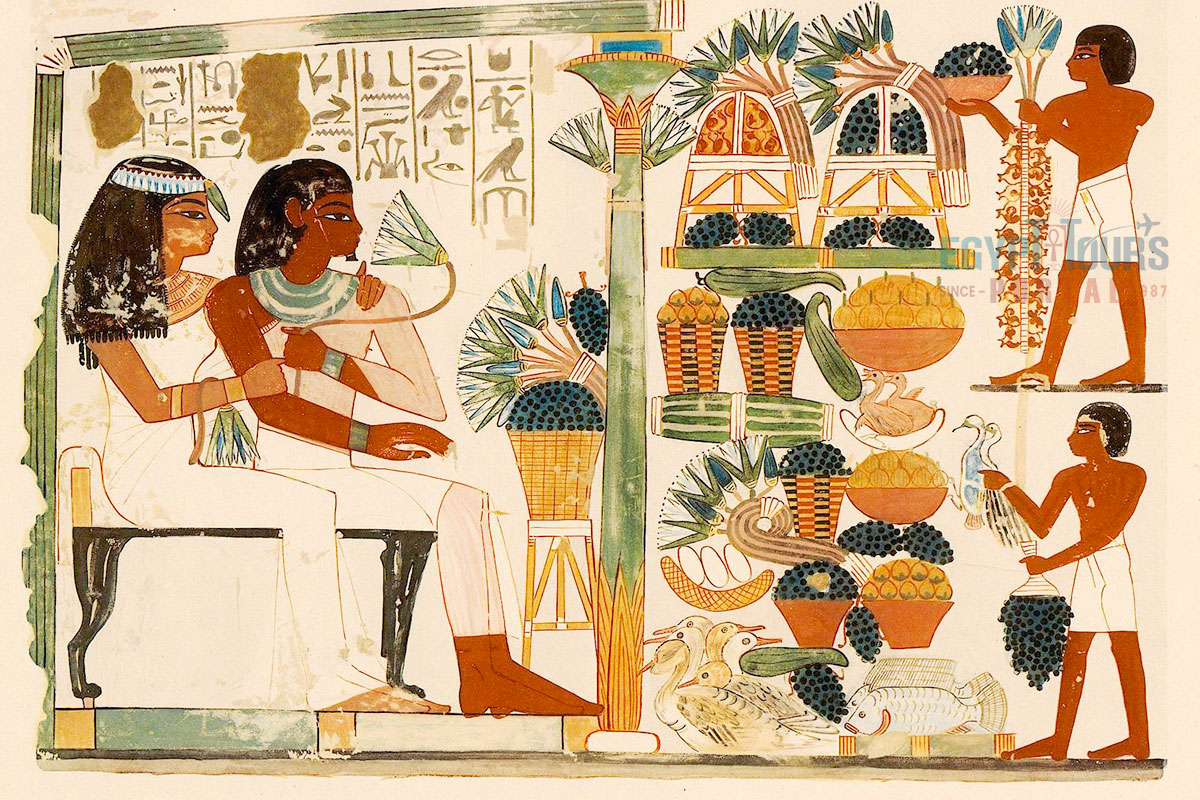
The cuisine of ancient Egypt was very mixed and diverse, consisting of a diverse range of foods. The diet of the ancient Egyptians varied depending on many factors such as social status, geographical location, and period. These foods offer a glimpse into the culinary differences and richness of this ancient civilization and how they managed to sustain themselves for millennia. The Bread was a staple food in ancient Egypt and formed the foundation of their diet, which was made of different types of bread, such as white, brown, and multi-grain, using barley and emmer wheat. Baking was a significant skill, and bread was often shaped into round loaves or small cones.
Beer was one of the most popular beverages in ancient Egypt as it was a nutritious and safer alternative to water, as the fermentation process killed off harmful bacteria. Beer was brewed from barley, and it came in various strengths and flavors. Wine was more expensive and reserved for wealthier, higher-up individuals. Grapes were cultivated, and the fermentation process was used to produce wine. Common types of meat consumed by the ancient Egyptians included beef, mutton, goat, and poultry such as duck and goose.
Meat was a luxury and primarily available to the wealthy and privileged classes. Fish was a significant part of the ancient Egyptian diet as they caught and consumed various types of fish, including catfish, perch, and tilapia. Fruits and Vegetables played a crucial role in the diet that included dates, figs, pomegranates, melons, onions, garlic, leeks, lettuce, cucumbers, chickpeas, lentils, beans, and more.
Honey was used as a sweetener and a natural preservative for certain foods and beverages. Milk, cheese, and butter were also part of the diet, primarily sourced from cows, goats, and sheep. The ancient Egyptians used various herbs and spices to enhance the flavor of their food. Some common examples include coriander, cumin, dill, mint, and thyme.
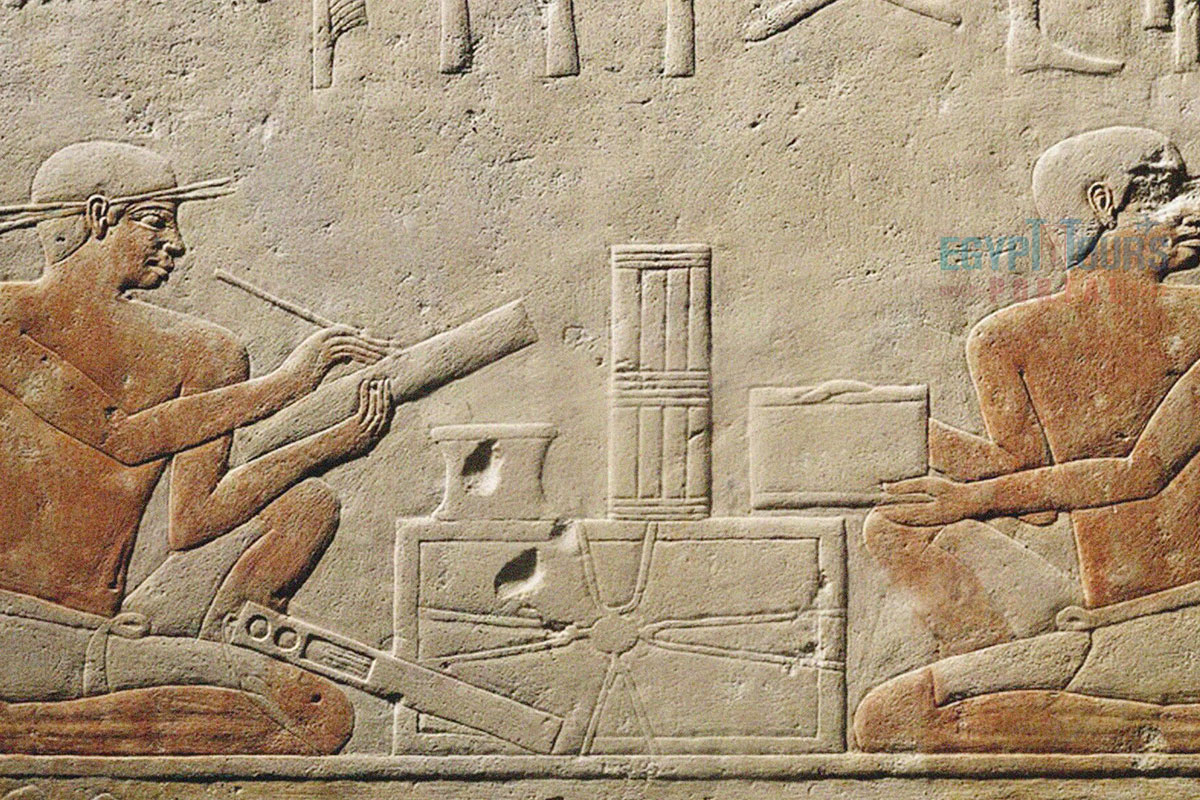
Ancient Egyptians valued education and knowledge, which played a significant role in shaping the society's structure, governance, and religious practices. The educated elite formed the backbone of the administration, contributing to the stability and continuity of the civilization for thousands of years. Education in ancient Egypt was primarily reserved for the elite classes, as only the sons and daughters of nobles were allowed to learn and become scribes who received formal education that involved learning hieroglyphics, mathematics, astronomy, and religious texts.
The education system in ancient Egypt was structured and aimed at imparting knowledge and skills required for various professions and administrative roles. Scribes and scholars also wrote instructional texts to pass down knowledge from one generation to the next. Education and intellectual pursuits held a crucial place in ancient Egyptian society. Education was primarily reserved for the elite and the sons of nobles, as well as those aspiring to become scribes, priests, or other specialized roles.
Scribal Education was the most prestigious form of education was the scribal school, where boys and some daughters from privileged families would learn reading, writing, mathematics, and the ancient Egyptian art of hieroglyphic script. Scribes played essential roles in administration, record-keeping, and communication, making scribal education highly valued. Priests received specialized education related to religious practices, rituals, and the knowledge of religious texts.
The ancient Egyptians had a good understanding of basic mathematics, as it was necessary for tasks such as surveying land and building structures, plus studying ancient Egyptian astronomy to observe celestial events, which were closely tied to their religious beliefs. Medical knowledge was primarily transmitted through oral traditions and apprenticeships to create people known as "physicians," who were skilled in herbal remedies, surgery, and diagnosing illnesses.
The ancient Egyptians produced a vast body of Egyptian literature, including religious Egyptian texts, myths, poetry, and wisdom literature, which was often part of the education of the elite and was used to teach moral values and principles. Intellectual pursuits included philosophical and moral discussions among the educated elite. Ancient Egyptians pondered questions about life, ethics, and the afterlife, as evidenced by some of their literary texts.
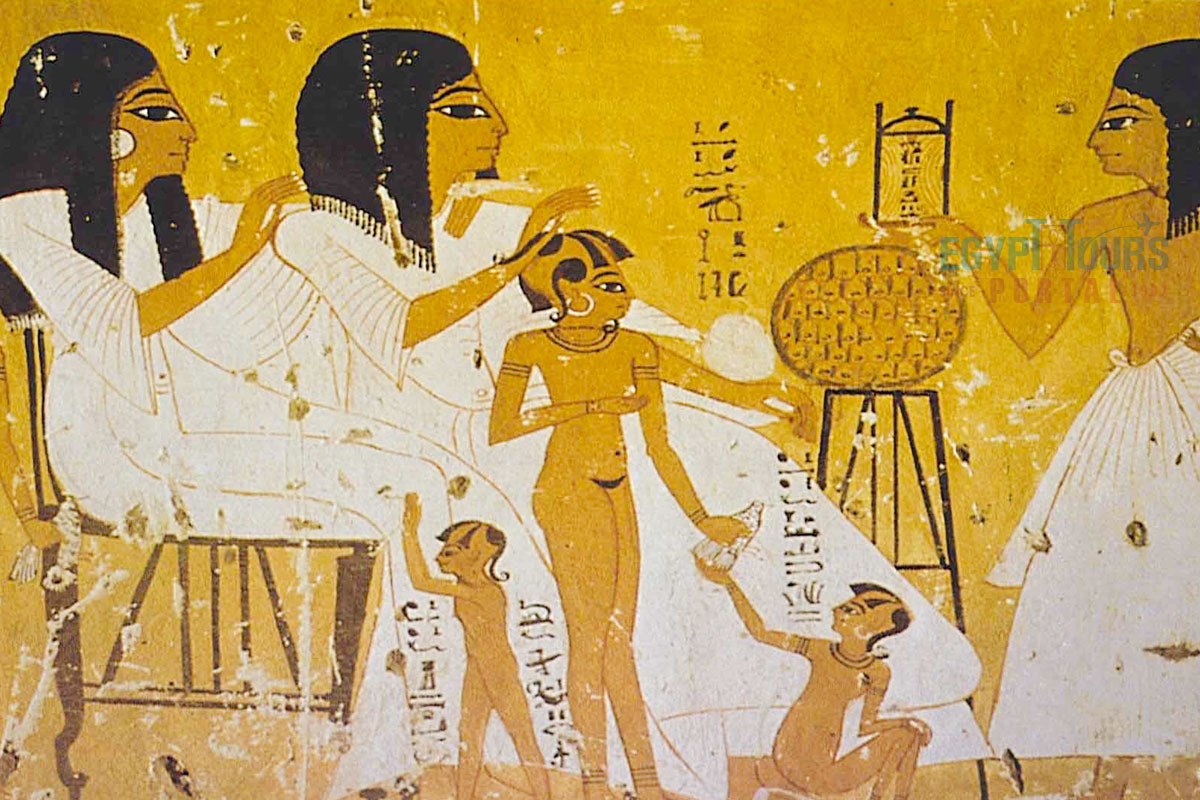
The ancient Egyptians were known for their elaborate fashion and beauty practices. Both men and women adorned themselves with jewelry made from precious metals and gemstones. They wore linen garments, and wealthy individuals often donned intricate and colorful clothing. Makeup, particularly kohl, was extensively used to enhance their appearance and protect against the sun's glare. Clothing in ancient Egypt varied depending on one's social status and occupation.
Men typically wore loincloths or kilts, while women wore draped garments, often made from linen. The length, quality, and style of the clothing could indicate a person's rank and wealth. Priests and high-ranking officials often wore more elaborate and finely woven garments, sometimes adorned with jewelry and precious stones.
Jewelry held great importance in ancient Egyptian society and was worn by both men and women. Common jewelry items included necklaces, bracelets, rings, earrings, and anklets. They were crafted from various materials such as gold, silver, semi-precious stones like lapis lazuli and turquoise, as well as faience. Makeup and Cosmetics were widely used in ancient Egypt, and both men and women applied makeup for beauty and religious purposes.
Kohl, made from powdered lead sulfide or other minerals, was used to line the eyes, creating an almond-shaped effect. It also served as protection from the sun and insects. Egyptians also used green and black eye shadow, henna for dyeing hair and nails, and various ointments and oils for skincare. Wigs were popular, especially among the elite and those who could afford them. They were worn for aesthetic reasons as well as to protect the head from the sun.
Wigs were made from human hair, wool, or plant fibers. Egyptians valued long, dark hair, and both men and women took great care of their hair, using scented oils and elaborate hairstyles. Perfumes and Fragrances were used by Ancient Egyptians as they used perfumes and scented oils extensively for both cosmetic and religious purposes. Fragrances were applied to the body, used in religious rituals, and also to scent their living spaces.
Tattoos were found on certain individuals in ancient Egypt, primarily on women. These tattoos were typically small and symbolic, often representing fertility or protection. Footwear was relatively simple and typically made of woven papyrus or leather. Sandals were the most common type of footwear, protecting the feet from the hot sand. Various types of headwear were worn, including headdresses, crowns, and headbands. The style of headwear also signified different religious roles or social statuses.
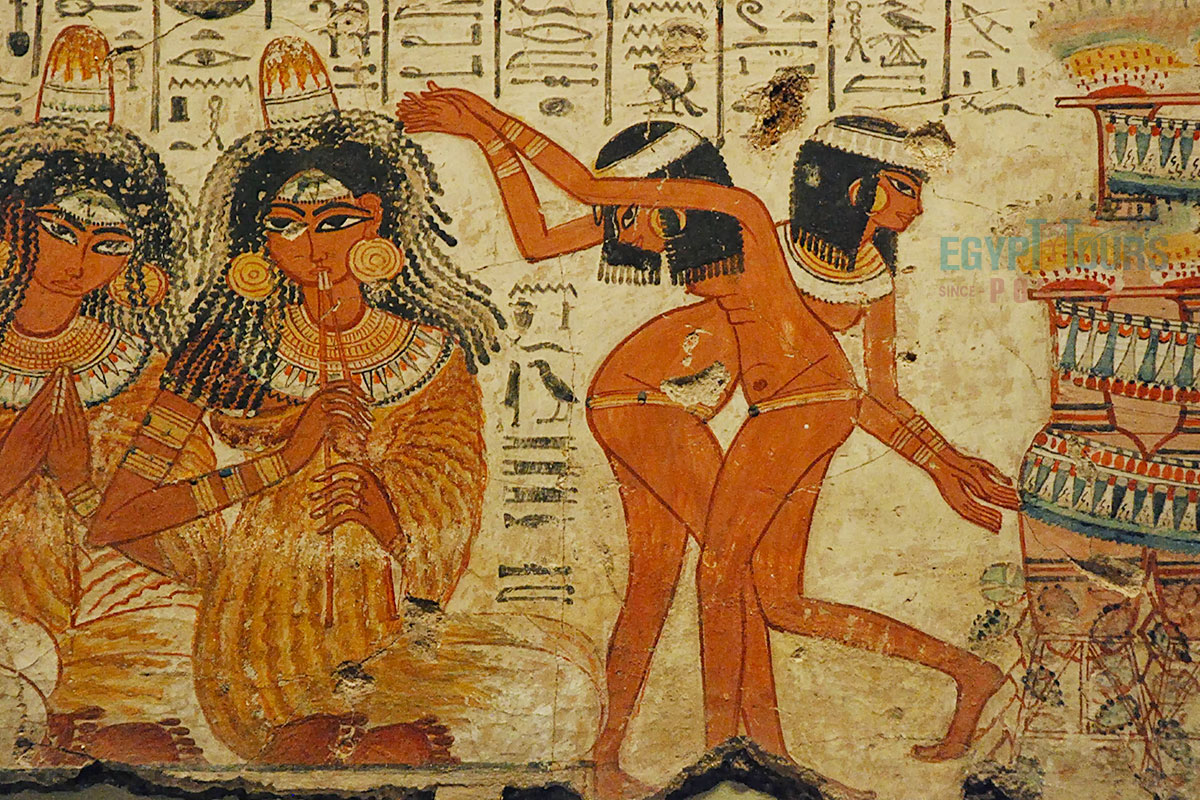
The Ancient Egyptians enjoyed various forms of leisure and entertainment, such as relaxing and engaging in recreational activities. Their leisure activities reflected their social status, wealth, and cultural preferences. These activities provided relaxation and enjoyment, helped build social bonds, and strengthened community ties. Ancient Egyptian Leisure and Entertainment: The ancient Egyptians had a rich array of leisure activities and entertainment.
Board games like Senet, Mehen, Hounds, and Jackals were widely enjoyed. Ancient Egyptian Sports and physical activities included wrestling, boxing, archery, and team sports like field hockey. Hunting and fishing were recreational pursuits for both the elite and common people, while boating and sailing on the Nile provided leisure opportunities. Music and dance were integral to their culture, with musicians playing instruments like harps, lyres, flutes, and drums. Festivals offered communal celebrations with music, dance, and religious rituals.

Life in ancient Egypt was not without its challenges. Ancient Egyptians had a remarkable understanding of certain medical conditions and treatments. They practiced preventive ancient Egyptian medicine, maintained a healthy lifestyle, and valued cleanliness. Additionally, religious beliefs played a role in health practices, as they believed in the power of prayer and rituals to aid in healing.
The annual flooding of the Nile brought both fertility and devastation, and the people had to adapt to the unpredictable waters. Sudden environmental happenings and work injuries acted as a challenge for ancient Egyptians daily. Diseases and medical conditions posed significant health challenges, but the ancient Egyptians possessed advanced knowledge of medicine and anatomy for their time.
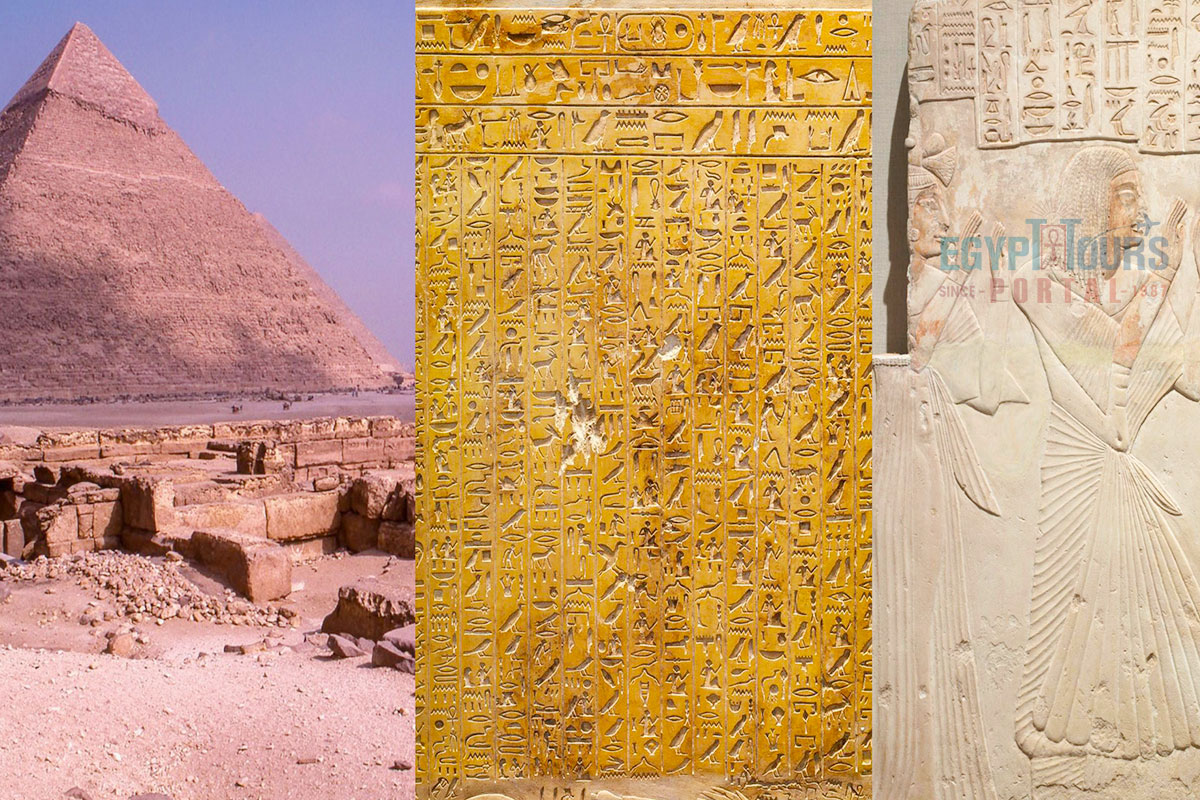
The achievements of the ancient Egyptians stand as a testament to their extraordinary capabilities and ingenuity. One of their most remarkable feats involved pioneering advanced construction techniques, enabling them to create awe-inspiring monuments like the majestic pyramids, grand temples, and towering obelisks. Ancient Egyptians developed one of the earliest writing systems known as hieroglyphics.
These intricate symbols were used for religious texts, monumental inscriptions, and administrative purposes. The decipherment of hieroglyphics in the 19th century provided invaluable insights into the history and culture of ancient Egypt. These structures remain marvels of human engineering. The ancient Egyptians displayed a remarkable aptitude for intellectual pursuits and their architectural prowess. They developed an intricate system of mathematics that laid the foundation for various scientific advancements. Moreover, their practical medical system demonstrated a deep understanding of the human body and its ailments.
The ancient Egyptians developed a calendar based on the lunar and solar cycles. Their calendar was an essential tool for agricultural planning and religious observances. The ancient Egyptians were not only masters of the land but also skilled manipulators of water resources. Their innovations in irrigation and agriculture greatly bolstered food production and supported the flourishing of their civilization. The ancient Egyptians' inventions include creating the earliest known plank boats. These vessels played a crucial role in their trade and exploration endeavors, further establishing their dominance in the ancient world.
The Egyptians were pioneers in the fields of faience and glass technology. Their mastery of these crafts allowed them to create intricate and exquisite artifacts that continue to mesmerize the world even today. The ancient Egyptians left an indelible mark on culture and literature. They birthed new forms of literary expression that have influenced storytelling throughout history.
Additionally, their legacy includes the earliest known peace treaty, a remarkable diplomatic achievement made with the Hittites, showcasing their ability to navigate complex political landscapes. As a result of their artistic and architectural brilliance, the allure of ancient Egypt spread far and wide. Their distinctive styles were imitated across different regions, and their antiquities found their way to various corners of the globe.
Witness all the many customs and traditions of the ancient Egyptian civilization
Read MoreThe ancient Egyptian people were a complex and vibrant society with a rich mixture of customs, beliefs, and achievements. From the awe-inspiring pharaohs and skilled scribes to the resilient farmers and craftsmen, each individual played a crucial role in shaping the civilization's success.
Their legacy endures as a testament to human ingenuity, spirituality, and artistic expression, leaving an indelible mark on the world and inspiring generations to come. Our travelers from all over the world will come to explore the natural and man-made spectacles of this blessed travel destination with our amazing Egypt vacations and a marvelous Nile cruise.
Private 4 Days Cairo Tour Packages for Australian Travelers 4 days Cairo Egypt Tour ...
Tour Location: Cairo – Giza...
5 Days Cairo and Alexandria Tour Package For Australian Travelers 5 days Cairo and A...
Tour Location: Cairo/Giza/Alexandria...
6 Days Cairo, Luxor & Aswan Tour Package For Australian Travelers 6 days Cairo, ...
Tour Location: Cairo/Giza/Aswan/Luxor...
Amazing 7 Days Cairo and Hurghada Holiday for Australian Travelers 7 Days Cairo &...
Tour Location: Cairo – Giza – Hurgh...
Ancient Egyptian art followed strict stylistic conventions. Humans were shown in "composite perspective" with heads and legs in profile, torsos facing forward. Important figures like pharaohs and gods were depicted larger due to the hierarchical scale. Men were often painted reddish-brown, and women light yellow. Animals were highly symbolic—e.g., falcons for Horus, lions for strength, and represented gods or natural forces.
Most Egyptians lived in mudbrick homes made from sun-dried Nile mud. Commoners’ homes had simple construction with mud-plastered walls and roofs of palm branches and straw. Wealthier citizens lived in larger, more elaborate homes made of stone or mudbrick with multiple rooms, courtyards, pools, and wooden roofs.
Households commonly included extended family, parents, children, grandparents, and sometimes other relatives. Rural families often lived in multi-generational homes, helping each other with farming and preserving traditions.
Ancient Egyptians were deeply religious, worshipping a large pantheon and practicing rituals. Most were farmers, with a strong respect for authority, and a hierarchical society led by the pharaoh. Education was limited to the elites. They developed hieroglyphics and made advancements in architecture, medicine, mathematics, and astronomy.
The average ancient Egyptian man was about 5'6" (167 cm), and the average woman about 5'2" (157 cm), based on skeletal evidence. As in any society, heights varied.
Poor Egyptians ate mainly bread made from emmer wheat or barley, vegetables (onions, garlic, beans, cabbage), and fish. They drank beer made from barley and occasionally ate fruits like dates and figs. Dairy products were limited, and meat was reserved for festivals or special occasions.
The entire country of Egypt deserve to be explored with its every heavenly detail but there are places that must be seen before any other such as the breathtaking Hurghada's red sea, The wonders of Cairo the pyramids of Giza, the great sphinx, the Egyptian Museum, Khan El Khalili Bazaar, the wonders of Luxor like Valley of the Kings, Karnak & Hatshepsut temple and the wonders of Aswan such as Abu Simbel temples, Philea temple, Unfinished obelisk and The Wonders of Alexandria like Qaitbat Citadel, Pompey's Pillar and Alexandria Library. Read more about the best places to visit in Egypt.
If you want to apply for a Visa On Arrival that lasts for 30 days then you should be one of the eligible countries, have a valid passport with at least 6 months remaining and pay 25$ USD in cash, as for the E-Visa for 30 day you should have a valid passport for at least 8 months, complete the online application, pay the e-visa fee then print the e-visa to later be presented to the airport border guard. You could also be one of the lucky ones who can obtain a free visa for 90 days. Read more about Egypt travel visa.
Egypt has a variety of delicious cuisines but we recommend “Ful & Ta’meya (Fava Beans and Falafel)”, Mulukhiya, “Koshary”, a traditional Egyptian pasta dish, and Kebab & Kofta, the Egyptian traditional meat dish.
The best time to travel to Egypt is during the winter from September to April as the climate becomes a little tropical accompanied by a magical atmosphere of warm weather with a winter breeze. You will be notified in the week of your trip if the Climate is unsafe and if any changes have been made.
You should pack everything you could ever need in a small bag so you could move easily between your destinations.
We have been creating the finest vacations for more than 20 years around the most majestic destinations in Egypt. Our staff consists of the best operators, guides and drivers who dedicate all of their time & effort to make you have the perfect vacation. All of our tours are customized by Travel, Financial & Time consultants to fit your every possible need during your vacation. It doesn't go without saying that your safety and comfort are our main priority and all of our resources will be directed to provide the finest atmosphere until you return home.
You will feel safe in Egypt as the current atmosphere of the country is quite peaceful after the government took powerful measures like restructuring the entire tourist police to include all the important and tourist attractions in Egypt. Read more about is it safe to travel to Egypt.
Wear whatever feels right and comfortable. It is advised to wear something light and comfortable footwear like a closed-toe shoe to sustain the terrain of Egypt. Put on sun block during your time in Egypt in the summer to protect yourself from the sun.
The best activity is by far boarding a Nile Cruise between Luxor and Aswan or Vise Versa. Witness the beauty of Egypt from a hot balloon or a plane and try all the delicious Egyptian cuisines and drinks plus shopping in old Cairo. Explore the allure and wonders of the red sea in the magical city resorts of Egypt like Hurghada and many more by diving and snorkeling in the marine life or Hurghada. Behold the mesmerizing western desert by a safari trip under the heavenly Egyptian skies.
There are a lot of public holidays in Egypt too many to count either religious or nation, the most important festivals are the holy month of Ramadan which ends with Eid Al Fitr, Christmas and new years eve. Read more about festivals & publich holidays in Egypt.
Egypt is considered to be one of the most liberal Islamic countries but it has become a little bit conservative in the last couple of decades so it is advised to avoid showing your chest, shoulders or legs below the knees.
Arabic is the official language and Most Egyptians, who live in the cities, speak or understand English or at least some English words or phrases. Fewer Egyptians can speak French, Italian, Spanish, and German. Professional tour guides, who work in the tourism sector, are equipped to handle visitors who cannot speak Arabic and they will speak enough English and other languages to fulfill the needs of all our clients.
The fastest way is a car, of course, a taxi. If you are in Cairo ride a white taxi to move faster or you could board the fastest way of transportation in Egypt metro if the roads are in rush hour.
The temperature in Egypt ranges from 37c to 14 c. Summer in Egypt is somehow hot but sometimes it becomes cold at night and winter is cool and mild. The average of low temperatures vary from 9.5 °C in the wintertime to 23 °C in the summertime and the average high temperatures vary from 17 °C in the wintertime to 32 °C in the summertime. The temperature is moderate all along the coasts.
It is the home of everything a traveler might be looking for from amazing historical sites dating to more than 4000 years to enchanting city resorts & beaches. You will live the vacation you deserve as Egypt has everything you could possibly imagine.









